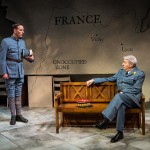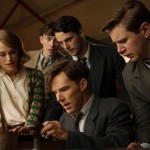Robert Tanitch reviews Versailles at Donmar Theatre, London WC2
10 million soldiers and 7 million civilians died in World War 1. Many historians feel that the Treaty of Versailles, signed in 1919, far from ensuring a lasting peace actually precipitated World War 2.
Peter Gill has taken his inspiration from John Maynard Keynes’ The Economic Consequences of Peace, which was published in 1919 and which argued for less brutal retribution. The French wanted to keep Germany as weak as possible. The British maintained that it would be fatal economically not only for Germany but for Europe. The decisions and misjudgements made in Versailles affect us all today.
Gill examines the impact of the war, the Treaty and the peace on a group of upper middle class people. The result is a lively, intellectual debate. The dialogue is of the most literate kind, and acted within a handsome Edwardian drawing-room setting, Versailles feels like a play by Harley Granville Barker, all talk, full of long speeches, and so dense that it makes enormous demands on actors and audience alike.
 The leading character is a minor diplomat (Gwilym Lee) serving in the British legation. A socialist, his idealism is quickly shattered and he resigns. His sister (Tamla Kari) does not want to marry a young man (Josh O’Connor) who has been traumatised by the horrors he had witnessed in the front line.
The leading character is a minor diplomat (Gwilym Lee) serving in the British legation. A socialist, his idealism is quickly shattered and he resigns. His sister (Tamla Kari) does not want to marry a young man (Josh O’Connor) who has been traumatised by the horrors he had witnessed in the front line.
The diplomat, a Keynesian-like figure, is visited throughout the play by the ghost of his best friend and lover (Tom Hughes), who died in the War, and is there to prick his conscience and remind him that nothing will change unless the middle classes do something about it.
Peter Gill directs and there are also fine, solid performances by Francesca Annis and Barbara Flynn as grieving mothers and by Adrian Lukas and Simon Williams, who represent the old order of self-interest and the status quo.
Versailles is the sort of play you come out of the theatre wanting to read the text.
To learn more about Robert Tanitch and his reviews, click here to go to his website




